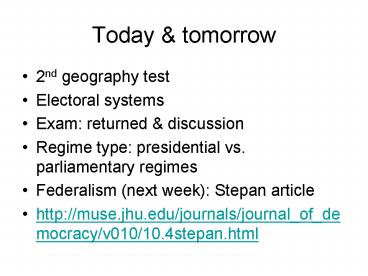Today PowerPoint PPT Presentation
1 / 31
Title: Today
1
Today tomorrow
- 2nd geography test
- Electoral systems
- Exam returned discussion
- Regime type presidential vs. parliamentary
regimes - Federalism (next week) Stepan article
- http//muse.jhu.edu/journals/journal_of_democracy/
v010/10.4stepan.html
2
Next exams
- Changes
- More multiple choice questions
- Readings and lectures
- Movies included in the total grade (no extra
credit)
3
Definitions
- Civilization vs. ethnicity
- Civilization highest cultural grouping short of
what separates us from other species - Kuznets effect inequality increases, then
decreases - Ethnicity no regional component
- Newly Industrialized Countries vs. Second World
4
Multiple Choice
- (1) Highest rates of growth
- Neither mentioned nor true
- (2) Corrupt form of government by the many
democracy (see lecture notes) - (3) Huntington a conservative critique of
modernization theory (Handelman, notes) - (4) Inglehart survival vs. well-being and
traditional vs. secular-rational (notes)
5
Multiple Choice
- (5) While both (a) and (c) may be true, only (b)
supports Huntingtons thesis - Movies
- (2) The shooting down of the airplane
- (3) Reducing inequalities
6
Short answers
- (3) Inglehart modernization 1 2 parts
- (4) Huntington six reasons discussion
- E.g., rise of fundamentalism correct, but
why? - (5) Vertical accountability military?
- Military vs. democratic hierarchy
7
Institutional Design Conflict Management
- Regime type, electoral system, federalism
8
Institutional design
- Three philosophies/approaches
- Majoritarianism
- Consensualism
- Centripetalism
9
Three major institutions
- Electoral system majoritarian or proportional
- Regime type presidential or parliamentary
- Territorial division of authority unitary vs.
federal state
10
Reilly Centripetalism
- Can democracy survive in divided societies?
- The politics of outbidding
- Extremist rhetoric and policies more
rewarding than moderation
11
Classical model of electoral competition
(economic conflicts)
12
Incentives for moderation
- Most voters centrists (moderate) position
- Single-member district, first-past-the-post
(plurality) elections - Two-party competition, with moderate
candidates/parties vying for the center - Does this logic apply for ethnic conflict?
13
Cultural vs. economic conflicts
- Huntington Cultural characteristics are less
mutable than political and economic ones - Or, what are you? rather than which side are
you on? - What works in a society characterized primarily
by economic conflicts (left-vs.-right, or
liberal-vs.-conservative), does not necessarily
work in a society where the primary conflicts are
cultural
14
Ethnic/cultural conflict (e.g., Ukraine)
15
Can formal institutions help?
- What is the nature of ethnic identity?
- Primordial vs. constructed
- Divided society
- Not just (i) ethnically diverse, but also
- (ii) Ethnicity is a politically salient cleavage
around which interests are organized for
political purposes (e.g., elections)
16
Institutionalist claim
- (Changing) political institutions
- (Change in) political behavior
- The design of political institutions is paramount
in conflict management
17
(Electoral) Institutions
- Institutions rules and constraints which shape
human interaction and, as a consequence,
behavioral incentives - Electoral systems
- ? Some ES encourage hostile and uncooperative
behavior, - ? While others provide incentives towards
cooperation, moderation accommodation
18
Centripetalism centripetal institutions
- Centripetal political system centrist, rather
than extremist, political competition - Centripetal institutions designed to encourage
moderate, centrist forms of political
competition, - rather than polarizing centrifugal patterns
19
The theory of centripetalism
- Democracy a continual process of conflict
management - Conflicts resolved via negotiation and reciprocal
cooperation, rather than simple majority rule - Cross-ethnic coalitions undermined by the
dominance of overarching group identities and
loyalties
20
Creating inter-group accommodation
- One promising path present political parties and
candidates with incentives to cooperate across
ethnic lines - Electoral institutions (legislative executive
elections) - Electoral sequences (federal systems)
21
Benefits
- Encouraging moderate, centrist political
competition - Creation of bargaining arenas reciprocal
interactions are, in and by themselves, likely to
facilitate cooperation
22
Centripetalism
- A normative theory of institutional design
designed to encourage three related but distinct
phenomena in divided societies - Electoral incentives
- Arenas of bargaining
- Centrist, aggregative political parties
23
- Electoral incentives politicians reach out and
attract votes from various ethnic groups - Arenas of bargaining political actors have an
incentive to bargain and negotiate - Centrist, aggregative political parties seeking
multi-ethnic support
24
How?
- Types of electoral systems
- Outcomes Majoritarian vs. proportional
- Incentives conflict vs. bargaining
cross-group appeals - Preferential voting
25
Electoral systems
- How votes are translated into seats
- Votes
- Electoral system
- Seats
26
Choosing the electoral system
- Two goals
- (i) Proportionality accurate/fair
representation - (ii) Efficiency choosing a government (a
government that can govern) - (Third goal? Encouraging cooperation?)
27
Tradeoffs
- Ideally, we would like to have the cake and eat
it, too maximize both representation and
efficiency - Hard to achieve in practice one tends to come at
the expense of the other - Prioritize and choose accordingly
28
Two types of electoral formulas
- (i) favor proportionality?
- Choose proportional representation
- (ii) favor efficiency/governability?
- Choose a majoritarian system
29
Electoral systemstwo features
- District magnitude (M) of representatives
elected in one district - Formula the specific mechanism translating votes
into seats
30
Majority/plurality systems
- District magnitude M 1
- Formula
- plurality/FPTP (U.S., U.K., India, Papua New
Guinea - new) - majority-runoff (France)
- alternative vote (Australia, Papua New Guinea -
old)
31
Proportional systems
- District magnitude 1 lt M S (assembly size)
- Formula
- party list PR (Israel, W Europe)
- STV (Single Transferable Vote Ireland, Malta)

